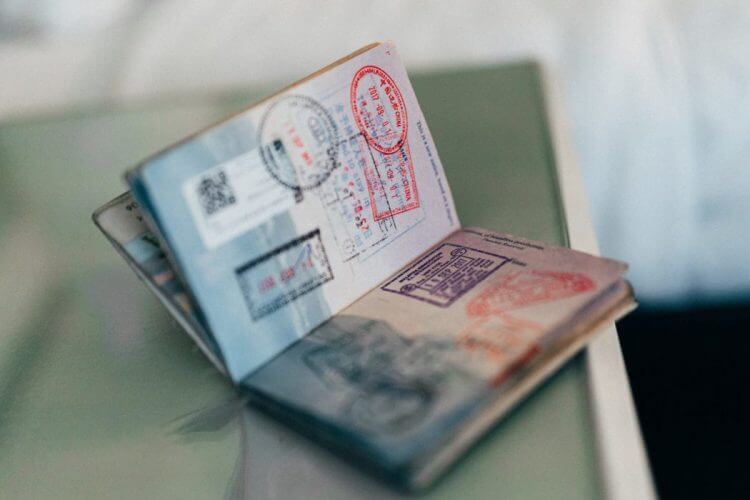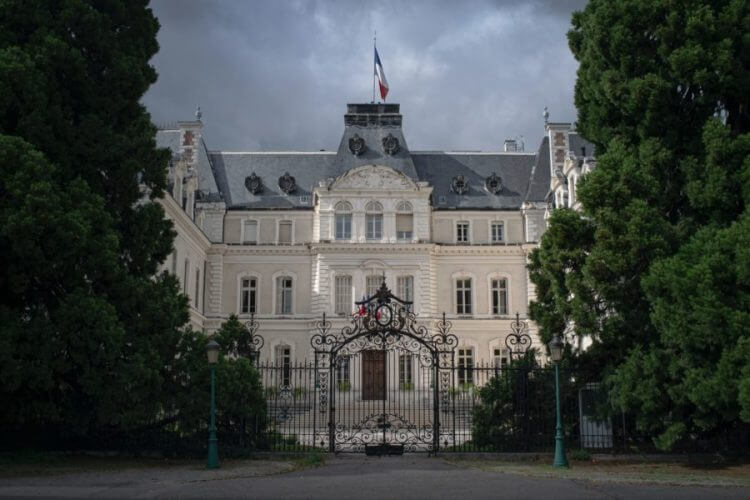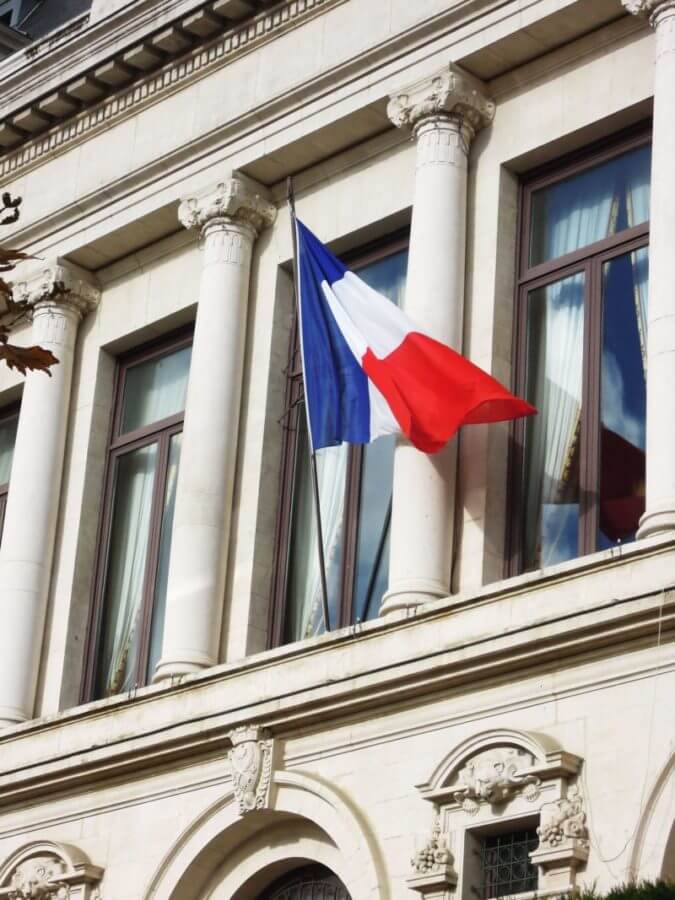You are planning to spend an extended period in France? You may need to apply for a France long-term visa. Depending on the purpose of your travel, the France long-term visa, also called the France long-stay visitor visa, might be your best option. Let’s see why, for whom, and how!

Table of Contents
What is a France long-term visa?
The first thing to consider is the duration of your stay in France since the 90-day rule applies in all the Schengen Area.
If you are from a non-EU country and want to come to France (or any other Schengen country) for more than 90 days during 180 days (6 months), you will need to apply for a France long-term visa (visa D). You’ll be able to figure out the exact number of days in the Schengen zone by using the official EU Commission online calculator.
If you want to come for a shorter duration, then the short-stay visitor visa (also called Schengen visa) will apply, if your nationality doesn’t have a visa exemption for stays under 90 days.
Note that the short-stay visa cannot be extended and you will have to leave France when it expires. If you plan to come back to France under a tourist short-stay visa you will need to wait until the end of the 180-day duration (that started when you first entered France) to be able to come back.
There are several long-stay visa categories and the purpose of your travel to France will determine which visa to apply for.
The following specific motives will match the specific visas to apply for; it could be for work, to start a business, for studies, for spouses of French national or EU national, for au pair but also a family reunion (regroupement familial for spouses of non-EU citizens) or visit.
Here, we are focusing on the France long-term visitor visa (also called the long-stay visitor visa or long-stay tourist visa).

Who does the France long-term visa apply to?
Every non-EU citizen (including British nationals who didn’t move to France before December 31, 2020) must have a France long-term visa for stays over 90 days.
If your situation does not match one of the specific motives detailed above, you may still be wondering if the long-stay visitor visa is for you. Let me explain further and give you some examples.
If you do not intend to work in France (in the sense of having an employment contract in France or creating a company in France) and do not match the other motives detailed before, there is no doubt to have: a long-term visitor visa is what you need. You could be, for instance, an annuitant, a long-term tourist or coming to France to visit family or for other personal reasons.
Retirees that have contributed in France in the past will apply for a specific Retiree visa.
If you come regularly for an extended period in France (longer than 3 months) and are a second home-owner in France, you will also need to apply for this visa.
Also, the France long-term visa could be the first step before transitioning to another status. However you need to make sure your initial long-stay visitor visa is genuine since the Prefecture will investigate the reason why you initially opted for this visa. And may decline a change of status if there is a discrepancy.
The main situation that is often approved by the Prefecture (but not recommended) is if you are planning to marry your French partner in France and do not wish to return to your country after the marriage to request a French spouse visa (Visa Vie Privée et Familiale). You could request a France long-term visa. (Also check the requirements explained below before deciding it is your best option).
Your first step should be to fill in the visa wizard to confirm the visa matching for your situation.

What are the long-stay visitor visa requirements?
The two requirements to apply for a France long-term visa are:
- Not to work in France (either as salaried of a France-based company or having a French company),
- Have sufficient income to stay in France (the French minimum wage).
This can be your own resources (pensions, property income, etc.) or those of a family member. You can present bank statements or guarantees or proof of income from creditworthy people.
Housing conditions are also taken into account in the evaluation of resources (owner, tenant, free accommodation) and possibly guarantees provided by creditworthy people (your family in particular).
You can obtain this guarantee as :
- a dependent parent of your children who are legally resident in France,
- or as a partner in a PACS (having lived together for less than 1 year),
- or as a religious person (priest, imam, etc.) if you come to France to perform your duties.
Family allowances are not taken into account (since they are paid for the maintenance of children).
How to apply for a France long-term visa
Your first step should be to connect to the French administration’s visa wizard. It will confirm the visa type matches your situation. You will need to create an account, then complete the form and print out the result with the list of supporting documentation to submit with your visa application.
The list of documents will vary from one situation to another depending on your nationality, your country of residence when applying for the visa and the motive and duration of your stay in France.
The common list will be (provide the original + 2 copies of each):
- The filled-in application form
- Passport photos respecting the Prefecture rules
- Copy of the passport and all pages with stamps
- Proofs of income
- A certificate of honour attesting not to work in France
- Proof of address in France matching the duration of the visa request (it can be for example a rental lease agreement or a letter attesting you will be hosted with the dates, together with your host ID copy and their latest energy bill, and also Airbnb reservation (or equivalent).
- Medical insurance attestation
- If you are not a national of your country of residence: proof that you are legally residing in that country (residence permit).
Note that the amount of the visa fee varies depending on the country where you apply from, but 99 euros is a common fee for this visa type.
If you need more guidance to nail your long-stay Visitor visa request, you can receive more information on the Dream to Reality programme by providing your contact details just below.
Where to apply for a France long-term visa?
Which French consulate
Whatever the type of visa you are applying for, you should always request it at the French Consulate of your country of residence. So, for example, if you are British residing in the USA, you should request your French visa at the French consulate for your US state of residence.
The residency is determined by a valid residence permit (if you do not live in your country of origin).
Also, some French consulates have outsourced their visa application process to external service providers such as VFS Global or TLS. You will find the appropriate application process on the French Consulate website of your State of residence.
However, if you are a tourist, you should return to your country of legal residence or origin to request a France long-term visa from the appropriate French Consulate.

What to expect at the visa application appointment?
Depending on the Consulate, you may need to make an appointment to submit your visa application. Also, a different procedure may be in place during the covid pandemic depending on the country.
First, make sure you arrive on time, they usually let you in about 15 minutes before your scheduled appointment.
It is always a good idea to come overly prepared with all the documents requested when submitting the visa application request with 2 copies of each document.
I also recommend having other important documents with you (original + 2 copies) in case they ask you for extra information. It could be for example translated birth certificate, a marriage certificate, a letter explaining your project in France, or any invitation letter or justification of your stay in France.
The main purpose of the interview is to collect your visa application documents and ask you questions about these documents if needed.
What happens after the visa application submission?
Your France visa has been approved
Depending on the consulate the visa processing time could be somewhere between a few days to usually 2 weeks to either receive your visa by postal mail or to come in person to the consulate to retrieve your passport with your French visa.
You will also be provided with an OFII form with your visa. You should keep this document as you will need it to validate your visa once you arrive in France. The validation process is also explained in this document.
What to do if your French visa has been denied?
If unfortunately your visa has been denied, the cost of a long-stay visa will not be refunded.
If you plan to appeal the French visa rejection, it is essential to ask for the motive of visa rejection in writing as this document will be needed to make an official appeal. Not every consulate provides it as default and it will be hard to get if not impossible later on.
There are two ways to receive a French visa refusal:
- an express refusal notified in writing
- or an implicit visa refusal after two months without information after the submission date
You may contest this refusal within two months by filing an appeal with the French Visa Application Appeals Commission – a mandatory prior administrative appeal against a visa refusal.
This appeal which must be motivated and written in French can be filled with or without the help of a lawyer with this Commission to be able to refer the matter to the competent administrative judge, which is the Administrative Court of Nantes. This appeal is called “contentious”.
In parallel to the referral to the Commission, you can also choose to file a hierarchical appeal with the Ministry of Foreign Affairs or an ex gratia appeal with the Consulate to obtain the issuance of the visa.
However, neither the hierarchical appeal nor the informal appeal against a visa refusal will exempt the foreigner from referring the matter to the Commission at the same time, within two months of the notification of the decision to refuse the visa by the Consulate.

How to validate your France long-term visa?
Within 3 months of arriving
When you finally make it to France, within 3 months of your arrival you MUST validate your France long-term visa (VLS-TS: visa de long séjour valant titre de séjour – Initial France entry visa valid as a residence permit for the first year). The validation can be done online on this official website.
This visa validation is done with OFII (Office Français de l’Immigration et de l’Intégration).
You will need to provide the following information:
- your visa information
- your date of entry in France
- your address of residence in France
- your credit/debit card to pay the residence permit delivery tax (€250 for long-stay visa holders)
The OFII will then send you :
- a ” certificate of receipt of the OFII certificate application form “.
- convocation for the validation of the visa.
Your OFII appointment
On the day of the appointment, you must present the following documents:
- Your passport with the appropriate visa;
- The printout of the stamps purchased online on timbresofii.fr or the stamped letter with tax stamps, worth 250 euros;
- Your proof of address;
- Passport photo.
CAUTION: If you do not validate your visa within the 3-month time frame, you will no longer be staying legally in France and, as a result, you will not be able to cross the border into the Schengen area again!

How to renew your long-stay French visa?
The renewal process
It has now been almost one year since you live in France and your France long-term visa (VLS-TS – Initial France entry visa valid as a residence permit) will expire in the next 2 months.
To remain in France, you need to request a residence permit “Visiteur” at the local Prefecture.
There is no need to return to your home country to request a new entry visa.
Once you submit your residence permit request at the Prefecture, and only if your file is complete, you will be provided with a receipt (called récépissé). The récépissé authorises you to remain in France until you receive your permit, but only for the dates indicated on the document, usually 4 months, sometimes 6 for the initial request.
CAUTION: The recépissé for a first residence permit request (opposed to a residence permit renewal récepissé), doesn’t authorise to travel outside France. If you leave the country, this document will not allow you to get back in and depending on your nationality you will need to request a visa.
Once your residence permit is ready, you will be notified by the Prefecture by text message to come to pick it up in person.

List of documents to request your Residence Permit “Visiteur”:
- Personal records:
- passport (pages with the personal data and the entry stamp);
- birth certificate with filiation (original documents + French translations by a sworn translator by a French court of Appeal).
- if you are married: a marriage certificate (original documents + French translations by a sworn translator by a French court of Appeal) and your spouse’s valid residence permit or visa (VLS-TS) or national ID card for European citizens.
- if you have children: birth certificate with filiation of your children (original documents + French translations by a sworn translator by a French court of Appeal)
- Your VLS-TS (copy of your initial France Visitor entry visa)
- Proof of residence (less than 3 months old) stating your name:
- If you are a tenant:
– an energy bill such as electricity, gas, water, landline phone, and Internet in your name. CAREFUL: the mobile phone bill is usually not accepted.
– Lease or rental contract (less than 3 months old), successive rental payment receipts, - If you are staying at a hotel or a residence: proof of residence + a receipt for the previous month’s rent.
- If you are being hosted (in the case that your name is not on the rental contract or bills): a hand-written letter attesting to your residence signed by your host + your host’s last energy bill + a copy of your host’s proof of identity.
- If you are a tenant:
- 3 ID photos respecting the Prefecture requirements, format 35 mm x 45 mm
- Proof of the residence permit tax payment of 225 euros (200 euros for the tax + 25 euros for the physical card) is to be given when collecting the permit. See more information below.
Other documents may be required depending on your situation, so it is important to go over-prepared as explained previously.
In short
It may not seem like it but the France long-term visitor visa is the easiest long-term visa to get to come to France for more than 3 months.
The main reason is that this visa does not authorise to work. However, it is essential to prove sufficient funds to make a decent living in France and you will have open doors to live the life of your dreams in France.
I hope this France long-term visa guide will help you to navigate this visa request.




32 Comments
Daniel Nixon
Hello.
I am currently looking at two options of visa to spend more time with my girlfriend in France.
One is the long term visa and the other is entrepreneurial visa.
I currently run a small company in the UK in which I work around the world on a contract basis. Can I easily switch that business to France, pay taxes etc of course?
Or would it be more straightforward to try to take the long term visa?
Also, because of the nature of my business, would I be allowed to come and go to France as needed?
Any help greatly appreciated!
Mademoiselle Guiga
Hi Daniel,
From the 2 visas you are mentioning, only the Entrepreneur/profession liberate visa will allow you to be compliant in France from a tax point of view once you become tax resident in France. For more information on taxes, you should contact a tax lawyer.
More information on this visa here: https://expat-in-france.com/how-to-secure-profession-liberale-visa/
Yes, you can come and go with this visa as long as you are in France at the time of the renewal. Then, if you spend too much time outside France it may jeopardise your possibility to request the 10-year card or the French passport is this is your plan.
Best to you,
Sue
I am ‘renewing’ my VLS -T to allow me to stay up to 6 months in France. Because of the rules preventing me from renewing within 6 months of the expiry of my previous VLS -T, I cannot have my next VlS -T start before 11/02/23.
I will be applying for this visa in the UK at the begining of December.
I expect to be in France before the start date on the Visa (using the 90 in 180 days rule).
Do I need to exit France and then re enter to get my passport stamped on/after the start of the Visa, or I can i remain in France confident that from 11/02 the Visa is covering my stay?
Thank you for any advice you can give.
Mademoiselle Guiga
Hi Sue,
There are 2 types of Long-stay visa depending on what you enter in your France-visas form:
– The long-stay visa valid as a residence permit. Visa de long séjour valant titre de séjour (VLS- TS)
Some long-stay visas are valid as residence permit during their period of validity. This means that if the Consulate issues a VLS-TS you will not need to request a residence permit for the first year in France. Only a validation process will be needed and I will explain it in the next Module. However, you will need to “renew your VLS-TS” by the end of the first year to be able to remain in France with a residence permit.
– The Temporary Long-Stay visa. Visa de séjour temporaire (VLS-T)
This is also a one-year (or less) visa that cannot be renewed, under any circumstances. If you request this visa by mistake, you will need to go back to your home country by the end of the first year in France to request a new entry visa.
So I don’t know if you just forgot to mention the ‘S’ and you actually have a VLS-TS and not a VLS-T.
Now to answer your question, since you are a short-stay visa-exempt (as a UK national- but this would apply to other nationality not needing a short-stay visa), you can enter France as a visitor as long as it is no more than 90 days before your long-stay visa start date and your status will be changed automatically.
BEWARE – that you will not be able to work or register to the French healthcare or do most paperwork under the vfirst 90 days under the visitor status.
Best,
Eric
Hi,
My wife and I are planning to apply for a long stay France visa. We will be staying at a french friends apartment when we first arrive, but will subsequnetly find an appartment to rent. When we fill out the contacts part of the applicatioon, should we be checking the “a person will be accomodating me” box or the “my hotel or accomodation” box and filling out the details accordingly?
Thank you for your help.
Mademoiselle Guiga
Hi Eric,
If you’ll be staying at a friend’s place you should tick the corresponding box: “a person will be accommodating me”
Best,
gary barker
hello there,
me and my partner are relocating to france with our 23 year old son.
do we need to fill out 3 visa applications
or can i do this all on 1 ?
I have started to apply and on my application it asked if i was traveling with spouse.
but did not mention anyone else ie: son or daughter
please advise as we need this filled in asap
many thanks
Mademoiselle Guiga
Hi Gary,
Your over-aged son will need to make his independent visa request.
He will not be considered as your depend, being over 18 y.o., from an immigration point of view.
So, this means that you should fill out two France-visa file, the first one for you and your spouse and your son should do a separate one. Make sure you take 3 appointment with the consulate too.
Best,
Cheri Baird
Hello. I wish to retire permanently in France. I went there in February 2022 for 3 weeks to look at houses for purchase. I didn’t find one on that trip. I returned to the US, have just sold my home here and want to return to France and keep searching for a place to live. I have settled on the area of Aveyron as my preferred location. I have already purchased a return ticket to France ( one way) and leave on 3May 2022. I believe I need a long term visa, but I’m confused as to which type is best for me. After reading many different websites about this process, I’m now concerned that I don’t have enough time for a visa application to be processed, especially if I need to travel to San Francisco, CA ( I reside in far northern, coastal Washington state) for an in-person interview. Can you help me clarify what I need to do and when to get the correct long stay visa for France? Thank you!
Cheri Baird
This is an addendum to my previous message. I’m a US citizen, will have no problem meeting the French proof of adequate income requirements, in the process of getting private international health insurance coverage; I have reservations (proof of address) at a hotel & then an AirBNB for the month of May,so far. I plan to rent an apartment until I find a place to buy. I’ve been invited to helping out with planning & designing ornamental gardens ( on a volunteer basis) for the medicinal plant farm, Mas de Jammes (www.jardindejammes.fr) for character reference/ local contact. I’m an artist& retired residential garden designer. Hope this helps
Mademoiselle Guiga
Hello,
I believe the long-stay visitor visa (aka long term visa) matches your situation since you will not be working in France and have the resources to live in France via your US pension.
This visa is usually granted in under one month, so you are still in time.
All the best,
Kristina
First of all i would like to thank you for all this information ! Thank you for your time and effort.
We bought a house in france , and we would like to apply for the visa ” visteur” . ( me , my husband and i also have a daughter) .
– beside all the documents that we need to provide, should we provide a motivation letter ? If yes what we need to mention?
2- if we are applying ( me and my husband) and we have passive around 1,300€ . Can we mention for both ? Or each one should have his passive income ?
3- we registered our daughter in a french school, should we mention that in our motivation letter ? Or its better not to ?
I would really appreciate your reply thank you🙏
Mademoiselle Guiga
Hello Krsitina,
The income level should be 2* the French minimum wage since you are 2 adults requesting a visa.
Yes, it is always good to include a cover letter.
You can include in your cover letter that your daughter will go to French school. This will not have an impact as going to school is compulsory and since you will also be requesting a visa for a minor for her, it is obvious to the consulate that your daughter will go to school. I hope this makes sense.
Best to you,
Saif
Hi there,
I’m glad that i’ve come across this informative and beneficial website.
I’m a Sudanese citizen, my usual country of residency is Australia, where I work and spend most of the year, my partner is French; I hold VLS-TS “visitor” at the moment, and as the infromatin given, I can apply for the “Carte de sejour” 2 months before my current visa ends. and I want to hold into the residence permit so that I can come to France and Europe to visit my partner’s family and friends at anytime of the year without needing to go throught visa center and consulate hustles.
Therefore, given the situation of being in France for 3 months, I’d like to inquire if I can leave France and the return back at the time of online for the “carte de sejour”, would it be possible to do so? or Am I required to stay ?
how long does it take for the carte de sejour to be processed and the actual card be ready for collection?
Do I have to remain in France while under processing, or I still can leave France – knowing that I can’t retun with récepissé, but return when the card is issued and be mailed to me in Australia?
I appologize for the lengthy, and I believe you have actionable advices and information.
Best regards
Mademoiselle Guiga
Hello Saif,
You do not need to get out of the country to renew your permit, you can request a long-stay visitor permit from the Prefecture in France if you continue to meet the requirement of this status.
CAUTION: The recépissé for a first residence permit request (opposed to a residence permit renewal récepissé), doesn’t authorise to travel outside France. If you leave the country, this document will not allow you to get back in and you will need to request a visa, eventually a “visa de retour”.
If you are currently on a VLT-TS, therefore you are requesting your first permit and the recepisse will not authorise you to enter back into France. I cannot advise on the processing time of the Prefecture. It can go from one month to much longer depending on the Prefecture.
If your permit is not ready on time and you end up travelling with your recepisse, you will have no problem getting out of France. But to come back in, you will need to request what we call a ‘visa de retour’ from the French consulate. Good luck!
Martyn
Hello, Hope you’re well. Just found this post: thank you for the information. As British citizens, we are wanting to relocate to France permanently later this year. We own a house in France and were married there five years ago. From our research, VLS-TS looks to be our best visa option as we don’t intend to initially work in France, whilst we renovate the house. Before the end of the first year, we would like to be established as micro-entrepreneurs running our own business. Would moving from VLS-TS to micro-entrepreneurs status be possible, do you know please? Following Brexit, would this be our best chance to eventually secure residency or is there a better visa journey to take? In gratitude, Martyn
Mademoiselle Guiga
Hello Martyn,
Thanks for your message. Just a small correction, VLS-TS refers to more than 20 different visas. It means a long-stay visa valid as a residence permit, then you have the “Visitor” VLS-TS (the one you are referring to) and among many others the VLS-TS Entrepreneur Profession liberale (the one you want to change status to).
A VLS-TS (type of visa) can only be requested outside of France so in your case, you will request a “Visitor” VLS-TS and request a change of status to an Entrepreneur Profession liberale “permit”. I hope this is not confusing you, but I think it is important to understand the process to be understood by the administration.
This change is possible but not easy since you’ll need to prove that you will make the annual French minimum wage by year one under a Profession liberale visa, not always easy when starting a business. And as a couple, this will mean 2 minimum wages, since there is no spouse visa for this status as I explain in the post.
Be careful, this is not a status only for micro-entrepreneurs (as I assume this is not the company structure you’ll have), but for any kind of company structure.
In your case, you may also want to look into the Entrepreneur Talent Passport if you meet the criteria. And the amount invested in the B&B will go towards the 30k investment. You will find more information here: https://expat-in-france.com/france-entrepreneur-visas/
All the best to you,
Dhivya Srinivasan
Hello Guiga,
This article has been so helpful and helped me categorize my visa accurately. I successfully got a France Visiteur Visa Type D stamped on my passport. I am wondering if my port of entry has to only be through France or can be through any Schengen States. My confusion mainly stems from the fact that the visa mentions “Valid in France sauf CTOM”. It would be great if you can help me with this.
Thanks 🙂
Mademoiselle Guiga
Hello Dhivya,
Congratulations!
If the words “FRANCE + 1 TRANSIT SCHENGEN” or “FRANCE except CTOM ” appears on the visa, this visa authorises you to settle in France and to travel within the Schengen area for a period of 90 days per period of 180 period of 180 days.
So you can transit via another Schengen state when first entering France.
Have a great trip to France! Best,
Roy & Judith
We are owners of a holiday home in France for many years and have regularly spent 8-9 months per year there which has now been curtailed. We’ve heard about The Long Stay visa and now your Long Term visa.
Are these the same ? If not which is the easiest one to navigate ?
I understand that there is a 99 euros charge for such a visa, but cannot get my head around the reference to an additional 250 euros ? will this be a requirement to get the 12 month visa.
Manythanjs for all your info
Rgds Roy & Judith
Mademoiselle Guiga
Hello Roy and Judith,
I guess you mean the “visitor” long-stay visa. A long-stay visa means a 12-month visa and there are more than 20 types of them.
Yes, the visitor long term visa is the same as the visitor long term visa.
The exact terminology would be visa long séjour visiteur, then, there are many translations.
99 euros is the cost of the visa (to enter France), and 250 euros is the cost of the permit -or the validation of the visa (to stay and reside in France).
This is a compulsory process that should be done on arrival, otherwise, you won’t be legally staying in France.
I hope this clarifies. Best to both of you
Kristina
Hello ! First of all congrats on your visa !!!
We bought a house in france , and we would like to apply to the visitor visa . Could you plz based on your experience, share some tips ? Should we write a cover letter ? What we need to mention in it ? And how much days it took you to get the visa ( all the process i mean how much time it tooks ) .
Sorry for questions 🙈 but i want to apply and i am super stressed. Thank youuu
Mademoiselle Guiga
Hello,
Yes, a short cover letter is recommended for every visa request even though it is not listed on the France-visas list.
You need to mention the reason you are requesting the visa and specify clearly the name of the visa you are requesting (in your case, I beleive a long-stay visitor visa).
The letter can be in English if you are requesting the visa from a French consulate where the official language is English.
The delays depend on the Consulates, but for this visa, it can go from one week to one month. Legally the consulate has up to 2 months to respond on a visa request.
I hope this answers your questions.
Best,
Dominic Shaw
Hello!
Very informative article! Just had a couple of follow up questions regarding my situation:
I am a US citizen looking to move permanently to France and eventually obtain citizenship.
I have enough cash savings to last for 5 years without working, so trying to get a work visa is not a concern.
After obtaining the visa for the first year, do you think I would be able to renew again for four more yearly periods and then apply for a permanent residency visa or citizenship?
Thanks in advance!
Mademoiselle Guiga
Hello Dominic,
The long-stay tourist visa is not a clear path to long-term residency. It really depends on the Prefecture and the situation.
You may receive a 10-year card after being on a long-stay tourist visa after 5 years but it is not always approved.
You may also request for naturalization by decree after 5 years but if you haven’t been paying taxes in France it is very unlikely to be approved.
I realize these are not the best of news, but this is the situation for this status I’m afraid.
All the best to you
PS. Also, you need to be aware that you cannot change your tourist long-stay visa to any other visa. So, if at some point, you want to have a work visa you’ll have to go back to the US to request it.
Cédric & Verónica
Good and Happy Day!!!
We are extremely grateful to have come across your site and have the chance to read all this information…
Thank you for your effort and time.
I am an American citizen currently residing in The United States of America.
Our situation is the following:
I am engaged to a French Citizen that is currently residing in France but, due to the Worldwide Health issues, we have not been able to carry on with our plans.
We would like to start a family in France.
My questions are the following:
If I understood correctly; would I be able to ask for a VLT-TS (Vie Privée et Familiale) for a year from The United States?
in that way, we could live together while planning for our wedding.
Could I request it by myself or my fiancee will have to also present documents?
Will this Visa allow me to work while in France?. This is very important for me.
Will I be able to travel with him throughout Europe with this Visa?
Where should we file for it in the United Estates? as they are many sites with false information.
How much will the cost be? Will the cost be in US dollars or Euros?
And what are the times frames to wait for the approval?
I was able to visit him in June of 2021, do we have to wait for 3 months in order to apply for the visa or to even visit again?
I understood that if I am approved for it; upon my arrival in France I will have 3 months to validate this Visa with the OFII (Office Français de l’immigration et de L ´Intégration)
How do I find this office?
I will also love to take the course for French. Is that something that you can ask for or will be at the discretion of the Office?
Where do you take these courses and how much will be the cost?
And lastly; 2 months prior to the expiration of this Visa we could ask for a change of status which will either extend the time on the same Visa or give me a French Residency? I am confused about this…
Will this depend on if we are legally married or living under the same roof?
When asking for a change of status before the Visa expires…
What is the difference between proving that you live under the same roof for over 6 months and being legally married?
This question came to us… afraid of a new shutdown because of Covid.
Also, he contracted Covid 19, and even after almost a year, he is living with the sequelae of the disease.
While I am about to have surgery for reconstruccion after being cancer free for over 3 years…
We have been together through high and low..
Which makes it even more important for us to reunite as soon is possible and make our dreams come true.
I apologize for having many questions…
Thank you kindly
Mademoiselle Guiga
Hello Cédric and Veronica,
Most of your questions are answered in this blog post: https://expat-in-france.com/french-spouse-visa/
You need to be married to request a Vie Privee et Familiale visa (or a change of status if you are already in France).
If you need further assistance to answer all of your questions, this can be done during a consultation. You will find more information here: https://expat-in-france.com/one-to-one-consult/
I hope this helps.
Kay Turner
Hi,
Just found your web site which is really helpful.
We have a second home in France and normally spend 6months in France mainly during the summer months but come and go due to elderly parents back in the UK
Does the visitors visa allow for travel exiting and re entering France? Or do we need a multi entry visa?
Any comments or suggestions on the best way forward would be really helpful
Thanks
Best wishes
Kay Turner
Mademoiselle Guiga
Hello Kay,
This visa is perfect for second homeowners that can justify incomes without working in France, it was done long long-term tourists or retirees.
You will have the liberty to come and go outside of the Schengen area once you got the OFII validation.
FYI – all the long-stay visas (to reside more than 6 months in France) allows getting back into the Schengen area after the OFII validation.
I hope this helps,
All the best in your projects!
Guiga
Ria
Hi! Thank you- this is extremely helpful
I have my registry which I am hoping to book very soon in Lyon, France (JULY) and I wanted to know a bit more about the process of living abroad as a British citizen (partner is French citizen). Would I be able to travel to Lyon without a long stay visa as I already have 90-day EU access and begin my paperwork for the carte de sejour?
It’s very hard to travel back and fourth from the UK to France due to the pandemic, so I was hoping to just finish all my paperwork there without having to return back to the UK.
Mademoiselle Guiga
Hello Ria,
As a British citizen, you are now considered as non-EU from an immigration perspective. This means that you need a visa to come to France for longer than 3 months.
Visas are always requested from your country of residence and CANNOT be requested in France. A transfer of your 90-days tourist visa is not possible in France, and for all nationalities.
There can be some tolerance (depending on the Prefecture) in case you are married (not PACS) to a French citizen and request the Residence permit Vie Privee et Familiale (French spouse visa) when you didn’t enter France with the appropriate visa – and with an extra tax to pay.
The type of visa will depend on the motive of your stay (work, long-term vacation, spouse of a French or studies). These are the main ones.
You will find a lot of information in these blog posts:
https://expat-in-france.com/category/immigration/
I hope this helps. All the best!
Mademoiselle Guiga
Just to make sure, you were not resident in France prior to 31 December 2020 which will allow you to request the withdrawal agreement visa before the end of June 2021, correct?